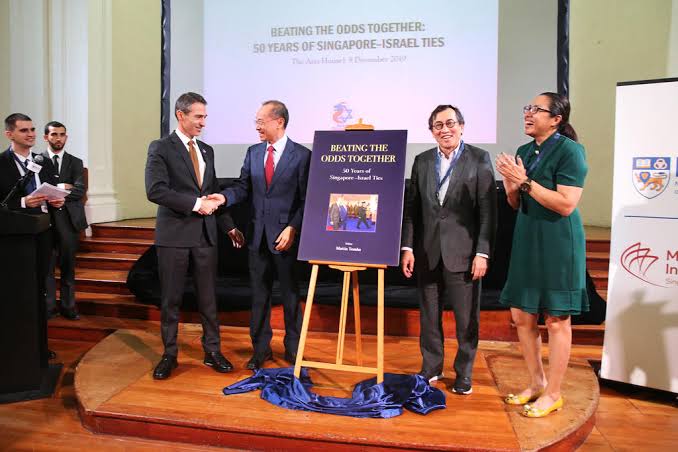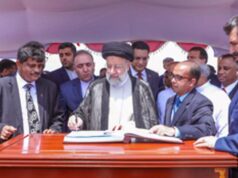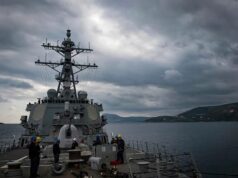Beating The Odds Together 50 Years Of Singapore – Israel Ties

Reflection of Singapore-Israel Relations
By
George Yeo
As a Secondary One student, looking at the Time Magazine map comparing the military forces of Israel with those of the surrounding Arab countries in early 1967, I feared for Israel’s ability to defend itself. Egyptian President Nasser had blockaded the Straits of Tiran, which was casus belli. War was inevitable.
As it happened, the Six-Day War saw a mighty Israel Defence Forces (IDF) vanquishing Arab military forces with seeming ease. I followed the battles day by day and became familiar with exotic places like Sharm el-Sheikh, el-Arish and Quneitra. Golda Meir, Moshe Dayan, Abba Eban, Ezer Weizman and Israel Tal became legends in my mind.
As a young teenager preparing for National Service, the Six-Day War gave hope that the young Singapore Armed Forces (SAF) could also be credible. After separation from Malaysia in August 1965, one of the first acts of nationhood was to pick up the gun, without which sovereignty had no meaning.
Lee Kuan Yew asked Nehru and Nasser for help to build up our defence forces, but both declined. He then turned to Levi Eshkol, who agreed. Israel’s prowess during the Six-Day War gave a huge boost to the SAF’s morale. We had found the right advisers.
Vacationing with my family in the Cameron Highlands at the end of 1965, my eldest brother reported that Lee Kuan Yew announced the introduction of compulsory military service. A certain excitement gripped us boys. For many Chinese families, the idea of becoming soldiers was foreign. As good iron is not used for making nails, good men do not become soldiers.
In order to overcome a deep cultural resistance to military careers, Lee Kuan Yew and Dr Goh Keng Swee introduced an SAF Scholarship scheme. Scholar-officer is a term peculiar to Singapore and a source of confusion to foreigners. For years, Israeli military advisers were deeply skeptical that “scholars” could provide the strong leadership a strong defence force required.
In 1969, Singapore established diplomatic relations with Israel. Our relations before that were discreet for fear of offending our Muslim neighbours. National servicemen were told that the military advisers were from Mexico.
In May 1969, racial riots broke out in Malaysia and spilled into Singapore. Concerned that the upsurge of Malay nationalism in Malaysia would become a problem for Singapore, a political decision was taken to roll out AMX-13 tanks on National Day, when the Malaysian PM was a guest. Our tank units were hardly ready for combat at that time, but a point was made. Openly recognising Israel that year was part of the same calculus.
In 1973, I went up to Cambridge as an SAF scholar. During Sunday Mass on a cold October morning at Fisher Hall, a woman student prayed for peace in the Middle East. War had broken out again in the region. Catching Israel by surprise, Egyptian forces crossed the Suez Canal and made rapid gains under the cover of Soviet surface-to-air missiles.
It was only after Ariel Sharon found a point of weakness in the Egyptian battlefront, broke through, crossed the Suez Canal and systematically destroyed surface-to-air missile batteries on the other side that the Israeli Air Force was able to unfurl its wings again.
After the ceasefire, Saudi Arabia weighed in and imposed an oil embargo on those who supported Israel. This first oil shock affected Singapore’s economy severely. Singapore was forced to recalibrate. The SAF told its Israeli military advisers to take off their uniforms. They became consultants. However, military relations with Israel continued to strengthen.
As a captain in late 1979, I was suddenly posted from Army Signals to the Air Plans Department of the Republic of Singapore Air Force (RSAF), which was expanding rapidly. In 1980, I was thrilled to be included in Defence Minister Howe Yoon Chong’s visit to Israel.
In the delegation were Second Permanent Secretary Philip Yeo, Director of Security and Intelligence Eddie Teo and Deputy Chief of General Staff Tan Chin Tiong. We visited an Israeli Air Force Base, the Golan Heights, Masada and Jerusalem, and met Israel Tal and Ezer Weizman. Minister Howe had a private meeting with Israeli PM Menachem Begin.
Israeli Air Force Commander David Ivry and Israeli Defence Ministry Secretary General Joseph Maayan arranged the detailed programme for our visit. It left an indelible impression on me. When David Ivry and Joseph Maayan visited Singapore separately in the months afterwards, I was asked by Philip Yeo to be their bag carrier.
David Ivry came to know Singapore well. At a personal level, he became like an uncle to me. When I became Head of Air Plans, he sent an adviser to help me at IAF (Israeli Air Force) expense. Col Yaakov Gal, a Mirage pilot who flew many sorties during the Six-Day War, was hands-on, constantly prodding us to change and improve.
I must have visited Israel 10 times in three years. After the Lebanon War in 1982, during which the IAF had complete dominance of the sky, I was given detailed briefings and shown cockpit film clips of air-to-air combat with the Syrian Air Force. David Ivry had insisted on taking part in a bombing mission to lead by example.
His staff told me that the entire mission was planned around keeping him safe. Commanders leading from the front was a core principle of the IDF. I developed a healthy respect for the IDF and learned much from their successes and setbacks. Some of their experiences were profoundly relevant to us; others, less so.
David Ivry felt strongly that the commander of the RSAF should always be a fighter pilot but we were not always able to achieve this. One day, while drawing up the layout for operational planning in the Air Force Command Post, Yaakov Gal objected to having different rooms for the planning teams. I had noticed this arrangement in their command post. He replied that Israelis constantly and loudly argued with one another and needed separate spaces for a bit of quiet. In Singapore’s case, we were less boisterous and could do with more debate and interaction.
I became an ardent student of the history and condition of Israel and the Jewish people. During my visits, I always made time to visit places, meet people and buy books. Yaakov, his wife, Amalia, and children became close family friends. Through him, David Ivry and others, I had a sense of the intensity of daily life.
Once, on our way to the Dead Sea, I asked Yaakov if he could make a detour for us to see Jericho (at that time still under Israeli occupation). He said, sure, and cheerfully asked his son, who was sitting next to him, if his pistol was in the glove compartment. Sitting at the back, my wife and I looked at each other somewhat disturbed.
A foreigner visiting Israel is often taken aback by the level of security. It takes a while to get used to loaded assault rifles slung on the shoulders of young soldiers pointing at our feet in hotel lifts. David Ivry had a son who was killed when the F-15 he was flying crashed during a training flight.
As a Cabinet minister in different portfolios, I endeavoured to foster close ties with Israel. After the Oslo Accords in 1993, the prospects for peace in the Middle East had improved so much, a senior Israeli official told me that it was possible to envisage driving from Cairo to Damascus in the not-too-distant future.
At Davos in 1999, Israeli Trade Minister Ran Cohen asked for a meeting. He wanted to visit Singapore with his Palestinian counterpart, and for the three of us to visit our Indonesian counterpart in Batam. Singapore’s economic cooperation with Indonesia should have been an inspiration to Israeli-Palestinian cooperation. My heart leapt and, on returning home, proceeded to make preparations. Unfortunately, within a few months, the Second Intifada broke out and the hope became a pipe dream.
Israel’s relations with its neighbours are fraught. Kissinger always argued that grand solutions were not possible. One should instead take small steps which opened up possibilities for the future, letting history find its course gradually. While there are some similarities between Israel’s circumstances and Singapore’s, the politics of South-east Asia are happily much more benign than the politics in the Middle East.
Former US Trade Representative Charlene Barshefsky compared Singapore to Israel when we launched negotiations for the US-Singapore Free Trade Area at the end of 2000. I was alarmed and quickly corrected her that while she could compare Israel to Singapore, not the other way around, please.
Over the last 50 years, Singapore’s relationship with Israel has deepened and broadened. There is mutual respect and affection. From time to time, Israel takes issue with Singapore’s lack of support at the UN and other international forums.
It could not be otherwise because Singapore has friendly relations with Palestine, all of Israel’s neighbours, and with Iran. We are also firm in our support for a two-state solution. Once, while visiting Syria, after receiving intelligence reports that Israel had made contact with Hamas, I met a senior Hamas representative to get a better sense of their perspective. I made clear our own. He knew Singapore had good relations with Israel.
Talking about Gaza, I remarked that it was half the size of Singapore, with less than half its population. He listened intently when I said that a country’s development depended ultimately on the quality of the people, not on the size of the country.
The Israeli Foreign Ministry was not happy that the meeting took place, but understood our intentions. I also took the opportunity to discuss Israel with Sheikh Qaradawi in Doha in 2004 and Grand Ayatollah Sharoudi in Qom in 2010.
When I visited Israel as Foreign Minister in 2007, I asked Deputy PM Avigdor Lieberman bluntly whether Israel’s settlement policy would not make a future two-state outcome impossible. He replied without hesitation that Israeli settlements were dismantled in Gaza and could be dismantled elsewhere if the political agreement called for it.
For years, Lee Kuan Yew avoided visiting Israel in order to maintain balance in our relationship with the Arab world. He left Israel to Dr Goh Keng Swee, who built up the defence relationship and had a shrewd understanding of the Israeli situation.
A visiting Israeli dignitary once lamented to him the fractiousness of Israeli domestic politics. Dr Goh guffawed, remarking that, under threat, the Israelis were solidly united, and that was what mattered.
In 1993, PM Rabin visited Singapore after the first Oslo Accord. He called on Lee Kuan Yew and, in a pro forma way, knowing Lee Kuan Yew’s longstanding policy of not going to Israel, invited him to make an official visit now that there was a peace agreement.
I was at the meeting and could see the surprise on Rabin’s face when the invitation was immediately accepted. The Singapore Foreign Ministry was surprised, too. Rabin hosted Lee Kuan Yew’s only visit to Israel, in May 1994. A year and a half later, he was assassinated.
So many personal friendships now bind our two countries together. On my visit to Israel in 2007,
David Ivry arranged for me and my wife to attend the IAF wings parade at Hatzerim. It was a moving experience. Not only was it attended by the Prime Minister, the Defence Minister and the IDF Chief of General Staff, but many retired Air Force commanders and senior officers were also present. I think we were among very few foreign guests that day. My wife and I felt like close friends invited to a family gathering.
In 2005, I was invited to speak at the American Jewish Committee Annual Gala Dinner in Washington DC. It was a rowdy affair. Several senior IDF officers from a visiting delegation attended in uniform. On the podium were the flags of the US, Israel and Singapore.
I recalled the critical contribution that Israel made to the build-up of the SAF in the early years of independence and talked about the implications of the rise of China and the rest of Asia on Israel and the Middle East.
In the Arab world, there were individuals who saw Israel as a latter-day Crusader state supported by the West which would eventually be extruded from the region again. Between Israel and the Arab countries, there were many reasons for the mutual distrust of each other’s promises. Seen within the existing geopolitical frame of the Arab world versus the West, there appeared no end to the endless cycle of distrust and violence. The re-emergence of Asia would enlarge the frame.
One could begin to re-imagine the future against a more distant past, when the Levant was a prosperous region connecting Asia to Europe. Israel should therefore look increasingly to Asia and build relations, especially with China, ASEAN and India. As it does so, Singapore’s contribution to Israel in the 21st century will become more important. Our 50th anniversary celebration is therefore not only of the past, but for the future.



